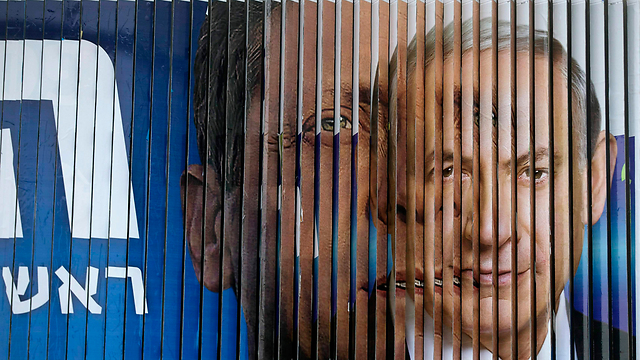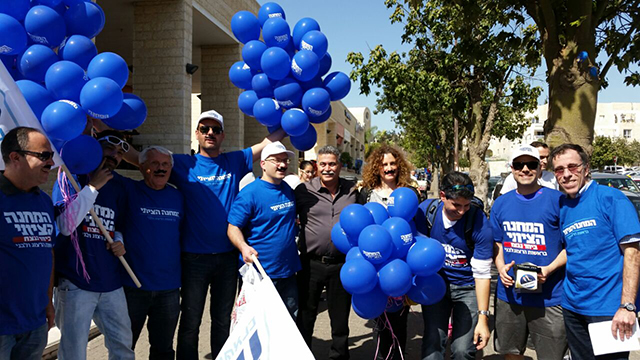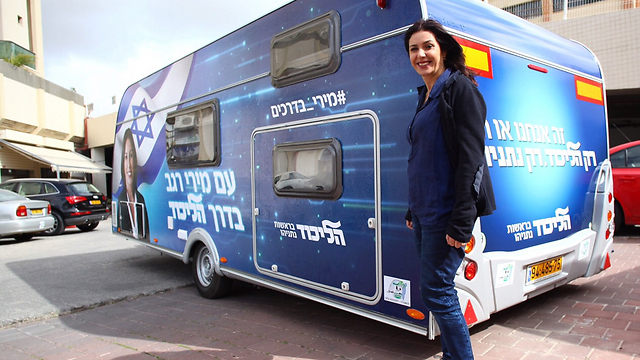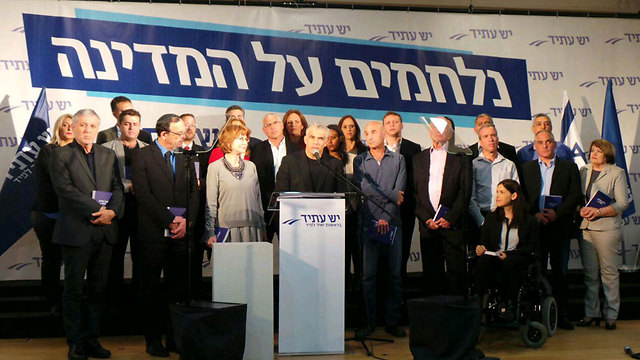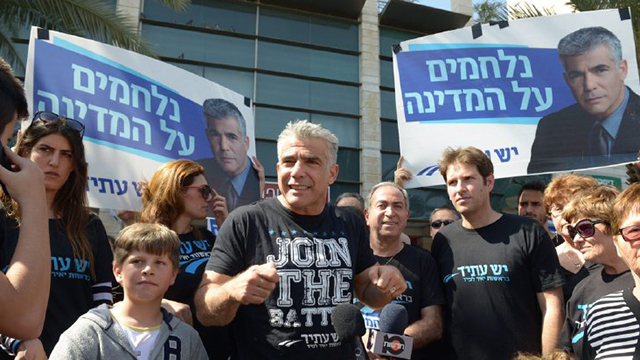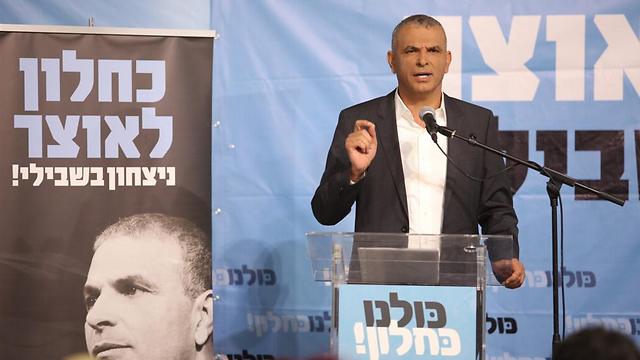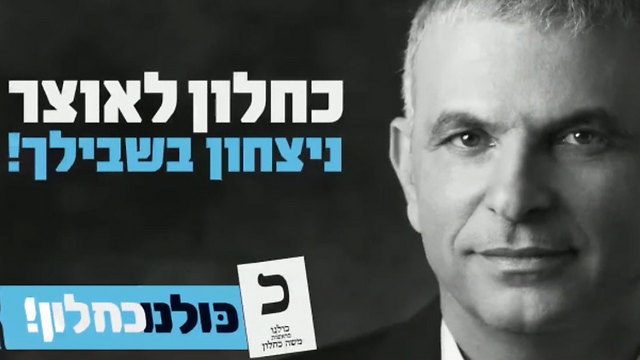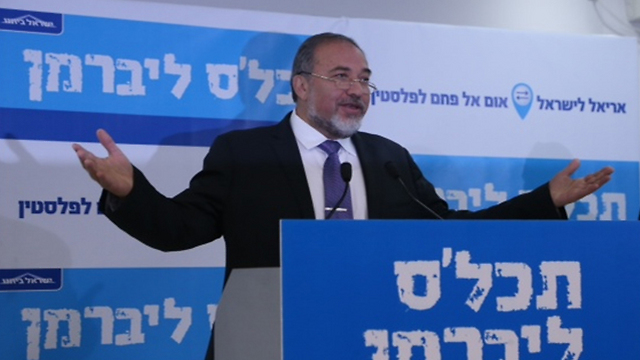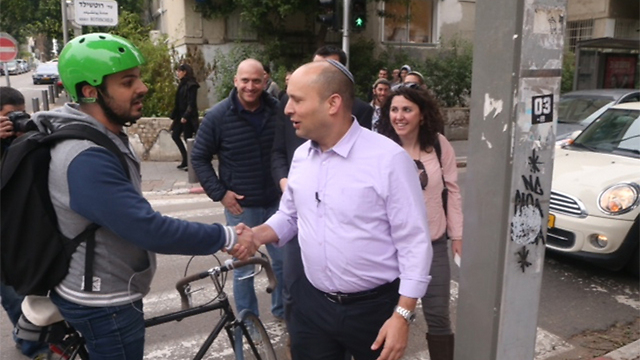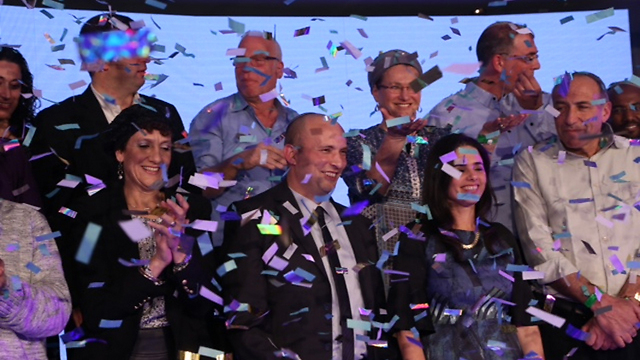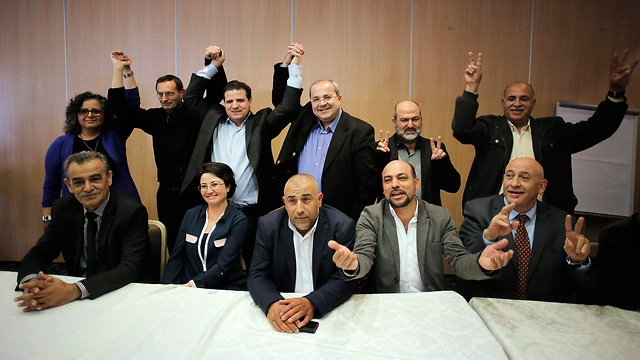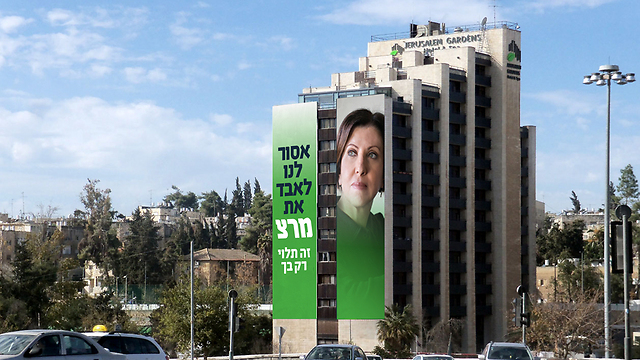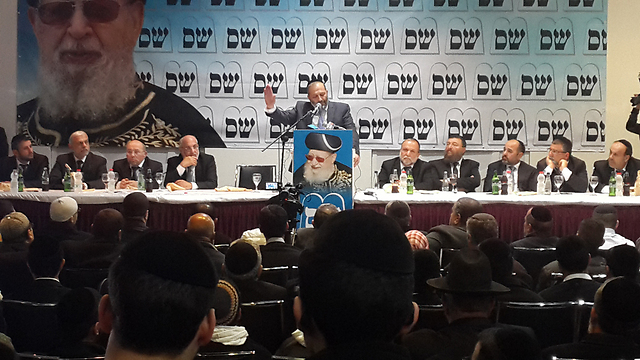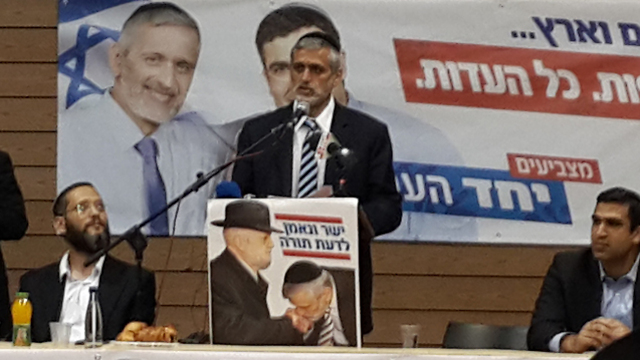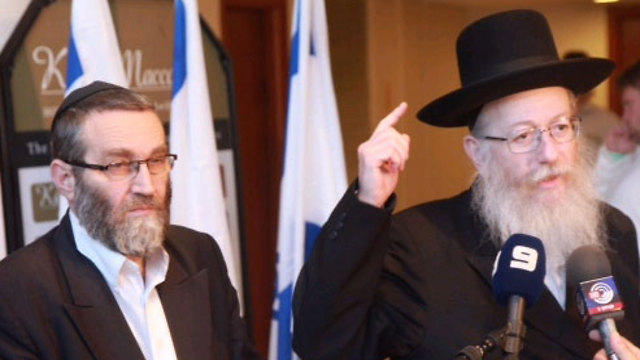
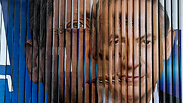
The 2015 election campaign has entered its final stretch on Tuesday, with parties moving their campaigning into high gear.
Ahead of the final week before the vote, parties' internal pollsters are making a last-ditch effort to identify new audiences, while strategists are fine-tuning the message and hundreds of activists are preparing for Election Day. The objectives: Getting more Knesset seats by winning over last-minute votes, hurting the chances of potential political rivals and fighting over every ballot.
Each party has its own plans for the final week of campaigning, ahead of the March 17 vote.
Zionist Union: Uniting the people
The Zionist Union will stick to the same strategy it has been implementing over the past few weeks, while putting an emphasis on field work. The strategy is clear at the party's election headquarters, and the main message will be hammered over and over again: "Each vote that is not cast for Zionist Union only perpetuates Netanyahu's rule." The party will stress that only a vote for its list can lead to a change in government.
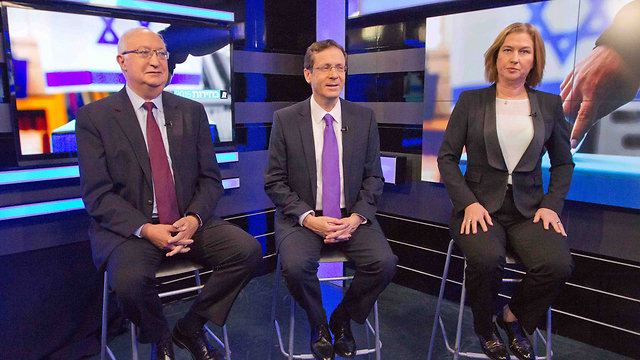
The party plans to focus its activity on major cities and the towns of the periphery. Their strategy: Visibility, visibility, visibility. All of the party's current MKs have been recruited to the last-minute effort, and will tell undecided voters and those disappointed with Likud that a strong Zionist Union is the only way to restore hope. The MKs will also point to the disappointment felt in Netanyahu's tenure and the divisions they say he caused in Israeli society.
Joint party leaders Isaac Herzog and Tzipi Livni will make separate and shared appearances in front of large audiences in an attempt to reach as many people as possible.
"We'll restore the hope that was lost," they will tell the public, stressing that, "The Zionist Union has a level-headed and responsible leadership."
Likud: Reclaiming voters from Bayit Yehudi
The Likud campaign will focus on the argument that Prime Minister Benjamin Netanyahu is the only one who can deal with diplomatic and security issues. Likud's talking points also include comments against a unity government with Zionist Union, as well as an emphasis on a united Jerusalem and on Likud's diplomatic and political experience, which will allow it to deal with internal and external threats, primarily Iran.
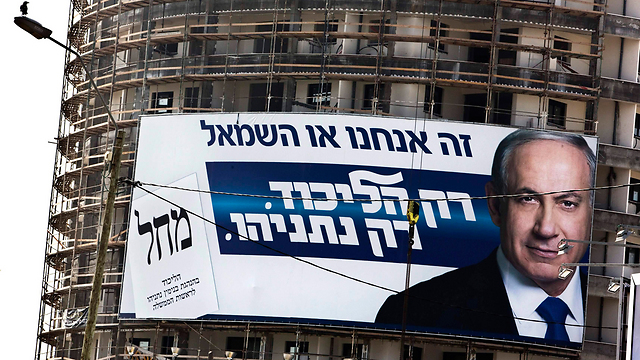
Unlike in past elections, the Likud party is also placing an emphasis on wooing settlers. MK Tzipi Hotovely toured several settlements as part of the election campaign to try to bring voters who switched to Bayit Yehudi back into the fold.
At the same time, MK Miri Regev is focusing the efforts on the socio-economic side of the campaign. The party is determined not to drop the ball on the socio-economic issue this time and the "Miri-mobile" caravan will continue making its way to markets and cities in the periphery to advertise Likud's achievements in social issues as well.
Yesh Atid: Targeting religious Zionists, Russians
Yesh Atid is encouraged by latest internal polls and is busy identifying new audiences to approach. Because of that, the party has decided not to implement any new strategies in the final week before the vote. Yesh Atid will continue along the same lines as in the past few weeks, emphasizing the party's achievements during its short tenure in government and the goals it has set for the next Knesset.
In addition to appearances by party leader Yair Lapid and other Yesh Atid MKs in house gatherings and political panels across the country, the campaign will focus on testimonies by citizens from all walks of life, whose lives they say have been improved thanks to Yesh Atid's achievements.
In addition, Yesh Atid is bracing for attacks on Lapid from other parties in the coming week, centered on his tenure as finance minister. Even so, the party has made a strategic decision to only issue positive statements and avoid responding to the anticipated attacks.
The party will also focus on voters who polls show could be won over during last-minute efforts. The party will primarily focus on religious Zionists (from whom, internal polls show, the party could receive at least one seat), voters from the Russian-speaking sector and undecided voters (which, according to the party's polling, could yield three or four seats).
Former education minister Shai Piron and new recruit Elazar Stern will focus on the religious Zionist sector, while MK Yoel Razvozov will work on the so-called "Russian vote". Dozens of party activists will continue calling undecided voters in an attempt to sway their vote in Yesh Atid's favor.
On Thursday, Lapid will host Yesh Atid's biggest conference of the election campaign, dubbed "The Momentum Conference," in a hall that can hold more than 1,000 people. Lapid's messages will focus mostly on motivating the party's activists to get as many supporters as possible to the polls.
Kulanu: Targeting Likud voters
The Kulanu party will focus its campaign on Likud voters who support its leader Moshe Kahlon, a former Likud minister himself. The party will put up billboards from Wednesday morning with the slogan: "A true Likudnik votes Kahlon."
The party is hammering home the message that the social side of Likud was represented by Kahlon, who formed a new social party in order to continue Menachem Begin's legacy.
Kahlon himself will also push messages referring to Likud under Begin, the party's loss of the way and its disregard for socio-economic problems. The campaign is targeting socially-oriented right-wingers, those disappointed with Likud and undecided voters, to convince them to throw their support behind Kulanu.
Internal polling conducted by the party shows there is a trend of some Likud voters leaning towards Kahlon, and Kualnu aims to take advantage of that momentum.
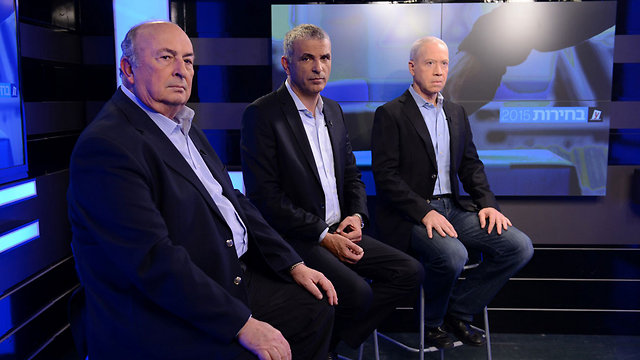
Kahlon will dedicate the final days before the elections to meeting activists, giving interviews in the media and attending political conferences. He will stress to Kulanu activists and volunteers that "without seats, we won't be able to get the finance portfolio. Kulanu is the only party that will handle social issues."
Yisrael Beytenu: Deploying Lieberman
Yisrael Beytenu will continue to push its main message, that the party will promote a bill proposal in the next Knesset calling for death sentence for terrorists. The campaign, which is already featured on billboards, will also appear on buses in northern and southern Israel. The party's activists around the country will sign people up for a petition supporting the bill proposal and party chairman Avigdor Lieberman will appear at some of these petition-signing events.
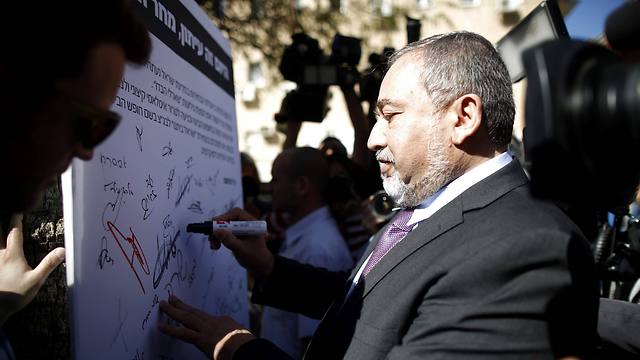
The party will focus its campaign in two directions: On the Russian-speaking audience and on other Israelis who previously voted for the party and are already familiar with its activities.
In the coming days, campaign videos will be released featuring MK Orly Levy-Abekasis, number 2 on the party's Knesset list, which will focus on the social initiatives the MK promoted, including canceling VAT on essential products and help for mortgage finance.
Bayit Yehudi: Anti-Lapid campaign
The Bayit Yehudi party will focus on three main topics in the final week of campaigning: Yair Lapid's failures, presenting party chairman Naftali Bennett's achievements and stressing the fact Bayit Yehudi is the "true right."
A campaign launched Tuesday will focus on Bennett's initiatives that were stonewalled by Lapid when the latter was finance minister.
This approach stems from the fact both Yesh Atid and Bayit Yehudi have identified two seats that could be up for grabs courtesy of young voters, soldiers and others who view both Bennett and Lapid as representatives of current and young politics, and believe they would deal with socio-economic issues.
In addition, Bayit Yehudi will focus on small business owners, the middle class and young people seeking for an alternative to the larger parties.
The final message the party will hammer home will be one for its natural voters, claiming that Bayit Yehudi is the last right-wing party standing, as all the others have conceded on the creation of a Palestinian state.
Joint Arab List: Door to door
The Joint Arab List will coordinate its forces with one goal: to dramatically increase voter turnout and win 15 seats in the elections.
The union of the three Arab parties - forced upon them when the threshold for winning a Knesset seat was raised to 3.25 percent of the vote – has on the one hand created a more powerful political entity, but on the other hand has led to a form of indifference on the Arab street towards Election Day. The tension that accompanied the previous elections due to the political struggles between the Arab parties has turned into a form of industrial peace, which could lead to a low voter turnout.
As part of its strategy, the List decided to adopt the mechanisms used in municipal elections, where voter turnout reaches 90 percent, whereas the standard in national elections is a far lower 54 percent. The party intends to do this through grassroots action, including door-to-door visits, social media and featured videos of Knesset members who are expected to win 70 percent of the vote in the Arab sector. Part of the campaign will also be devoted to the Jewish public, entitled "Your answer to racism."
Meretz: Fears the threshold
The Meretz party will wage a battle for survival next week. After warming itself throughout the last Knesset on poll results that showed it could win 10 seats, Meretz is now beginning to understand the genuine threat of the raised threshold. The party will in the final week launch a campaign with the slogan: "We must not lose Meretz, it's up to you", aiming to make an emotional appeal to Meretz voters, reminding them of the party's importance in Israeli society.
The campaign is based on internal polling, which shows that even those supporters who will vote for the Zionist Union still have sympathy and appreciation for the party, and have departed solely out of the desire to replace Netanyahu. As such, the party will highlight the fact that voting for the Zionist Union could mean that Meretz will not be in the next Knesset, depriving the center-left bloc of up to four seats and thereby ensuring another Netanyahu term.
Shas: Reaching 40,000 voters
The Sephardic religious party will focus its efforts on the database of 340,000 people who have voted for the party in the past, with the goal of bringing them back to the polls. In recent days, dozens of activists have gone from house to house, making the party's case, with the goal of reaching 400,000 eligible voters.
At the same time, activists will work the phones intensively, aiming to reach 12,000 voters every day. Their talking points mention the party's late spiritual leader Rabbi Ovadia Yosef, as well as an appeal to secular voters, in particular those of Mizrahi origin. Activists will emphasize again that without the three basic conditions, Shas will not sit in any government: zero-percent VAT on essential items, raising the minimum wage to NIS 30 per hour, and the allocation of 7.5 percent of any construction project for public housing.
Yachad: Ovadia Yosef and Baruch Marzel are as one
The Yachad party will focus its campaign on the principle of unity, and emphasizing the personal qualities of its leader Eli Yishai. The party stresses that Yishai is the successor to Maran ("our teacher") Rabbi Ovadia Yosef, and will claim that the recruitment of far-right activist Baruch Marzel to the party effectively saved the rightwing. Yishai and the other Yachad MKs will discuss how them coming together will prevent "another Oslo."
The target audience is clearly identified as former Shas supporters, Bayit Yehudi voters disappointed in the party who sat in a government that adopted religiously controversial legislation, and right-wing hardliners who naturally identify with the party's policies. The campaign will run for the next week under the slogans "Together (Yachad) we will win" and "I am Eli Yishai too."
United Torah Judaism: Social awareness is a mitzvah
The United Torah Judaism party will hold a street rally attended by tens of thousands of ultra-Orthodox Jews in Bnei Brak on Wednesday, in an effort to appeal to the Haredi street and ensure the support of its natural audience. The party will also continue to focus its efforts on enlisting public support by highlighting its social achievements. Unlike in previous elections, the party's campaign has this time emphasized the social side of its policies, and even launched an official Facebook page for its supporters.
In addition, the party is holding home debates to target secular voters, using party leading lights Yaakov Litzman and Moshe Gafni, who will emphasize their past social achievements, such as free dental care for children and the prevention of factory closures.
Ahead of Election Day, UTJ will distribute informational material to neighborhoods with a high concentration of Haredim, they will also take to the streets in vehicles with loudspeakers, playing UTJ election jingles and calls for rabbis to support the party.














